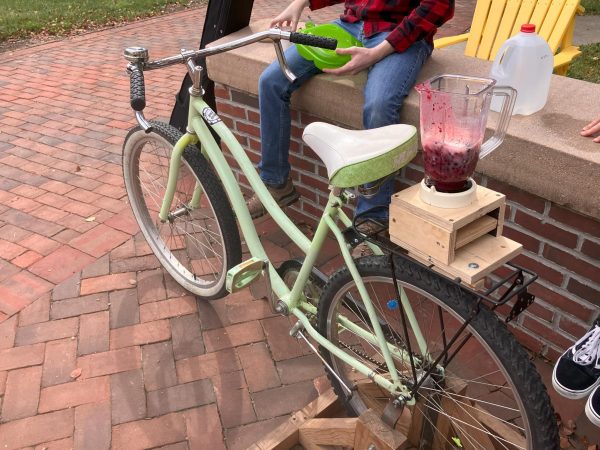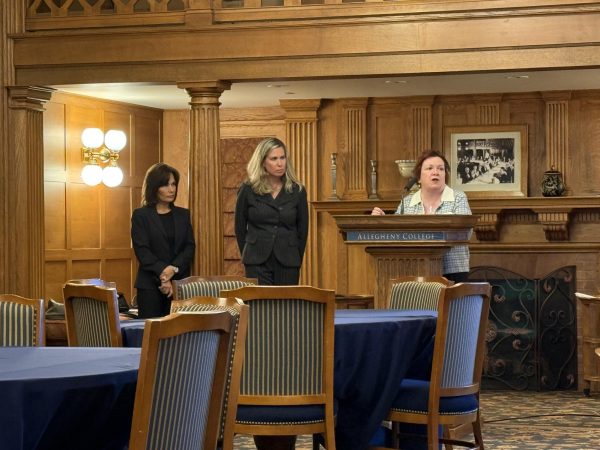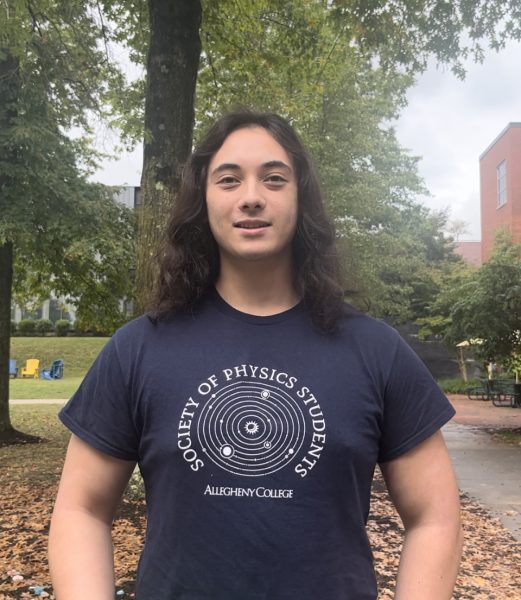Public safety incident escalates, local police get involved
A conflict between an intoxicated student and two public safety officers results in use of force and off-campus police.
Adrean Velez, ’21, was walking to visit his friends on Loomis Street just after midnight, Friday, Sept. 18, when an incident between him and two public safety officers escalated into both officers pinning Velez to the ground, according to two witnesses.
“I thought it was actually one of my roommates,” Jessica Margraf, ’21, said, who called campus security when her and her housemate, Tomoka Mano, ’22, did not recognize the individual who was knocking on their door. “It sounded like someone was throwing up, so I’d say probably two or three times I heard that noise.”
Margraf and Mano said they called aloud twice asking who was at the door, and heard no response, but once they approached their front door, Margraf said she could hear someone talking on the phone.
“I did call Public Safety explaining that someone was there,” Margraf said. “We didn’t know who it was, and we were just like, kind of scared and unsure of what the whole situation was about.” “I told him there was someone at our door. We weren’t sure who it was. We heard a few knocks but we were hesitant to open it because we were unsure. I told him that it sounded like a male’s voice and he was on the phone with someone … and I stated that he seemed like he was drunk.”
While on the phone, Margraf said Public Safety was responding to a call at College Court and remained on the phone with her for a few minutes until an officer arrived.
When the officer arrived, Margraf and Mano could hear the exchange between Public Safety and Velez.
“He asked him where he lived,” Margraf said. “We, at the time, were not sure if this was a college student or a townsperson, so that had us on edge a little bit. They talked through a few things, he had asked where he lived, the individual responded, and then the officer had directed him to go home … a lot more back-and-forth started going on, and we couldn’t hear everything.”
The witnesses were unable to hear the full conversation between Velez and Public Safety, but Margraf notes the tone of the discussion got audibly louder and more aggressive.
“We heard some yelling going on, some hysterical laughter, also you know, indicative of sort of the drunken state he was in,” Margraf said.
On the other end of the call was Claire Klima, ’21, who said Velez was on his way to his friend’s house. Klima heard a brief exchange between Velez and campus security before the call was disconnected.
According to Klima, in her witness report sent to April Thompson, vice president for student life and dean of students, Klima said that there was a man talking to Velez, that the man communicated that they had received a call about a drunk guy banging on a door, that Velez communicated that he thought that it was his friend’s house, and that the man said that Velez made the inhabitants feel threatened.
Klima states that this is when the call dropped.
Velez said he did not realize it at the time, but he had knocked on the wrong door, causing those student occupants to call public safety.
“We were in our living room and we heard someone yelling, saying that they were being assaulted,” said Zoe Konzel, ’21, a student who witnessed the incident with her housemate, Autumn Blaisdell, ’21, that night. “So, obviously, we looked outside and we saw someone on the ground, like being pinned to the ground by two people. At first we were like, okay, we don’t know what’s going on … And then we kept hearing the yelling, and I recognized the voice because (Velez) was a good friend of mine, and also my roommate (Blaisdell)’s. Konzel and Blaisdell then went on to their front porch and watched everything that happened.
According to the Public Safety Crime Log, 15 minutes after Velez’s interaction began there was a report of criminal mischief at College Court, where Klima was at that time. According to Klima, a Public Safety officer knocked on her door and said he was investigating an incident report of a rock thrown through the window of a student’s dorm residence nearby. He asked if she had seen Velez around earlier.
“What does this have to do with anything?” Klima recalled saying to the officer. “I knew that (Velez) was not in the area when I got off the phone with him.”
According to Klima, she asked the Public Safety officer where Velez was, and he told her Velez was in transit with the Meadville City Police. When the Public Safety officer left Klima’s dorm, she proceeded to call Meadville Police Department to verify where Velez was. The first call was placed around 1:00 a.m., and the police could not provide any information on Velez’s whereabouts. Klima then called Public Safety approximately 10 minutes later, and they informed her that Velez was in transit to the police station. Klima called two more times and received no additional information.. At approximately 1:30 a.m., Klima drove to the police station.
“In this political climate, s— just happens, okay,” Klima recalled of her conversation when she arrived at the Meadville precinct. “I just need to see him with my own two eyes.”
Klima stated that an officer on duty “said (Velez) could not leave for a minimum of six hours, and that he was not allowed a phone call because that was county policy … it was just super weird, and after a while, they called the (Director) of Public Safety out of sleep.”
Klima said this was the point when Director of Public Safety James Bassinger arrived at the station; he told Klima that Velez could be released that night if he was calm.
“The irony of this whole thing in my opinion, is that the college is trying to act like (Velez) is some sort of danger to this community, but I don’t understand how that could be the case if they let him come home with me,” Klima said.
On Sept. 28, Velez pleaded guilty to “Disorderly Conduct Engage In Fighting” and “Public Drunkenness And Similar Misconduct,” and paid around $400 in fines, according to court documents. The arresting officer is filed as Cprl. Quentin Shevitz, and Allegheny College, Safety and Sec. are listed as the arresting agency.
Velez believes that this incident is a part of a pattern of animosity between himself and a specific Public Safety officer who responded to the incident. The Campus was unable to confirm the identity of the officer.
Velez was the artist behind the controversial art piece which caused outcry in the local community and led to it being removed from public display.
According to Velez, an incident between him and the officer occured over the summer of 2019. Velez was moving between his summer housing and fall housing prematurely and, when Public Safety encountered Velez, the situation escalated. Velez believes that the officer responding to that incident was the same officer who interacted with him on Sept. 18.
“I literally thought I was going to die,” Velez said. “If I was a white student, it wouldn’t have gone that way.”
Velez stated that he was pinned on his stomach for 10 to 15 minutes, and that Public Safety officers escalated the situation. Both Blaisdell and Konzel, the students who witnessed most of the incident, confirm the length of time Velez says he was pinned.
Velez noted that his neck, back, wrists and head were sore, but he did not go to a doctor due to an inability to afford health insurance.
“I do not believe (Velez) was a threat of any type to the safety of this community,” Konzel said in her witness statement given to Maureen Muckinhaupt, director of student life operations & planning. “It is infuriating and embarrassing to see how campus security handled this situation and were able to treat a student.”
In the spring of 2019, an incident took place off-campus that led to Interim Director of Public Safety William Merchbaker removing a student from class to notify them about a warrant for their arrest.
In response, students organized protests and devised documents for changing policy regarding protocols for student privacy. Many students and faculty were alarmed and upset at the lack of privacy provided to the student, and demanded answers on questions regarding campus security and Meadville police protocol demanded answers.
Administration hosted two public forums to discuss potential action plans the college could take. During the forums, students and faculty expressed their feelings regarding police interacting with students of color, and concerns of racial profiling.
Administration proposed a plan to have student and faculty sessions regarding protocol when interacting with law enforcement for the following 2019 fall semester, along with mandatory sensitivity and bias training for all employees who work in the Office of Student Life scheduled to take place the following summer.
The Office of Public Safety declined to comment on individual incidents, but Bassinger clarified Public Safety’s policy on incidents like the one in spring of 2019 and the incident regarding Velez.
According to Bassinger, Public Safety has established policies for responding to intoxicated students, including when it is appropriate for the Meadville Police Department to become involved, as well as the appropriate time for use of force on students. Bassinger said that Public Safety cannot let students become a danger to themselves and officers make an effort to understand the situation when responding to calls.
According to Bassinger, when interacting with intoxicated students, Public Safety officers make an initial assessment of the situation then take appropriate action whether it is calling emergency medical services or getting other Allegheny College offices involved.
Additionally, Public Safety officers do not carry weapons, so if a student is acting aggressively, Meadville Police have the ability to intervene and take students into custody. Public Safety has a protocol when uses of force come into question. First, Public Safety arrives and acts as a visual deterrent. The officers will then engage in verbal communication to allow for an understanding of the situation by all parties involved. Then, officers may restrain students, and some officers carry handcuffs.
“The number one priority is for safety,” Bassinger said. “It is always better if Public Safety shows up first because they have other avenues of safety enforcement.”
Public Safety also has an agreement with the Meadville Police Department which gives Meadville Police the ability to come onto campus if a person is out of control, Bassinger said.
“Honestly, we thought it would be one officer taking care of it, coming to talk to us, and leaving the scene,” Mano said. “We believe it went on longer than it should have (and that) getting all the police involved was unnecessary.”
The morning after the incident, Velez received an email from Muckinhaupt, telling him that he needed to leave campus by the end of the day. Velez then left his on-campus housing. He has been in negotiations with, primarily, Muckinhaupt, and has recently agreed to learn remotely.





